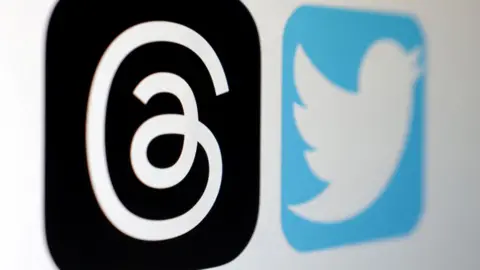Threads could cause real problems for Twitter
 Reuters
ReutersMeta has launched its much-teased rival to Twitter, Threads, in the UK and US. The BBC's technology editor Zoe Kleinman and North America technology correspondent James Clayton have both tried out the app. Here are their first impressions.
Zoe Kleinman, technology editor
It was the middle of the night in the UK when my phone buzzed to let me know that Meta Threads, the new social network app I'd pre-ordered on the App Store, had been installed.
Given the timing, I wasn't expecting much to be going on from a UK location. I already have an Instagram account so within three clicks I had a profile, and I selected to follow everybody I already follow on the photo-sharing app.
Suddenly it was like I'd walked through the door to a great big house party. Loads of people were signing up, writing their first posts, responding to others and commenting on the new surroundings.
I had dozens of followers in the first five minutes, and nearly 500 as I write this. (I've still got fewer than 300 on another Twitter alternative, the Jack Dorsey-founded text-based network, BlueSky, which I've been on for weeks.)
If you're familiar with Twitter, you'll recognise the design of Threads instantly. Everything from the heart-shaped symbol to "like" a post, to the circle of arrows denoting the feature to repost, is the same.
Some early complaints include the lack of a private messaging feature, no hashtags or trends to help navigate popular content, and no timeline curation options other than the ability to mute accounts or words, and block others.
But I feel we should add the word "yet" - Threads is officially only a few hours old (although it is its second outing following an earlier version in 2019 that was discontinued. Perhaps the world wasn't yet ready, or sufficiently annoyed with the goings on at Twitter).
What stands it apart from other Twitter rivals is the instant integration of this vast, ready-made Instagram community. Two billion people use the photo-sharing app and this offers an easy way for them all to land on another platform.
This makes it instantly engaging, which will appeal hugely to advertisers, who I imagine will eventually fund it, although there will apparently be no ads for the first year.
James Clayton, North America technology correspondent
First impressions of Threads: can Meta do this? Is this not somehow plagiarism?
The app looks almost identical to Twitter. The news feed, the reposting. It's all incredibly familiar.
Mark Zuckerberg claims millions of people have signed up in the first few hours. You should always be sceptical when a tech boss says how many users have signed up to a platform. But it does feel like a lot of people are already on it.
That's partly because it's connected to Instagram. Meta isn't creating an app from scratch. It's benefiting from its two billion Instagram followers that are giving it a massive shot in the arm.
Platforms like Bluesky and Mastodon did not have this luxury. They started with zero users.
But whether this is "fair" or not, Mr Zuckerberg doesn't care. He's copied other apps before to great success (Reels is a clone of TikTok) and he's happy to do so again.
Knowing the power of celebrity, Mr Zuckerberg has also utilised famous names on Instagram and managed to get some of them on Threads, like Shakira and Gordon Ramsay.
Mr Zuckerberg will be thrilled with the buzz around the app. When it comes to social media, it's all about the network effect. The more people use the app, the better the app is.
When it comes to social media, the network effect can create a sort of tipping point. When so many of your friends or people you want to hear from are on a platform, you kind of feel you have to join.
It's very, very hard to create a network effect on a social media platform. But when it works, it really works. The reverse is also true. When communities leave a social media platform, they can do so quickly - and it can be devastating. Think Myspace or Bebo.
Let's go to some of the problems with Threads, though.
Unlike Twitter, which has two feeds - a recommendations feed and an option just to see tweets from those you follow - Threads has just one feed that blends your followers and content it thinks you will want. That could get annoying.
It doesn't seem to have desktop functionality yet - it doesn't work well on your computer. That's a shame.
There doesn't seem to be any trending information, so it's hard to see what's going viral.
And when it comes to verification, users can still buy their blue ticks for a monthly fee, just as you can with Twitter.
Mark Zuckerberg described the app as an "initial version" - and that's what it feels like. It does the basics well. But this is a no-thrills app right now.
That said, Meta's boss will be over the moon with how this has gone so far. Considering the bad press he's got over the years, he is reinventing himself as the adult in the room - the sensible tech billionaire who wants a friendly social media platform.
You can tell this has riled Elon Musk. "Thank goodness they're so sanely run," he tweeted sarcastically on Monday.
But if Mr Zuckerberg was nervous that disaffected Twitter uses would spurn Meta's offer, so far, it looks like those fears were unfounded.
And if that is the case, with an app that works perfectly well, if not spectacularly, that could be a real problem for Mr Musk.
